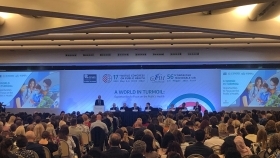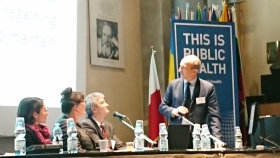
by strengthening education and training
of public health professionals
for both practice and research



The Association of Schools of Public Health in the European Region (ASPHER)
ASPHER is the key independent European organisation dedicated to strengthening the role of public health by improving education and training of public health professionals for both practice and research.Secretariat updates
Yesterday, after more than three years of intense negotiations, the Member States of the WHO unanimously adopted the new Pandemic Agreement, marking a historic milestone in global health governance. The Association of Schools of Public Health in the European Region (ASPHER) welcomes this unprecedented political commitment to strengthening global preparedness, prevention, and response to future health threats.
The agreement represents a significant step forward in many of the areas ASPHER has consistently advocated for throughout the drafting process, particularly:
- Health equity as a guiding principle: We highlight in particular Article 9.5, which, for the first time, obliges countries to develop policies that link public funding for biomedical R&D to conditions ensuring equitable access to vaccines, diagnostics, and treatments. This is a transformative measure toward science that truly serves the public good.
- Strengthening public health systems and surveillance: The treaty offers a strong legal basis for improving collaborative mechanisms for surveillance, prevention, and response, in line with the recommendations of public health professionals who led efforts during the COVID-19 pandemic.
- More inclusive and transparent governance: ASPHER has called for an approach that recognises the essential role of public health professionals, researchers, and academic institutions in decision-making. This must now be reflected in the mechanisms for national and regional implementation.
At the same time, we reiterate some of the key concerns ASPHER has raised throughout the process, particularly:
- The need to include local and community public health perspectives, ensuring that the voices of frontline professionals, students, and academic networks are part of implementation and evaluation mechanisms.
- The urgency of ensuring meaningful and binding commitments, especially in terms of sharing knowledge, data, and health technologies during emergencies, moving beyond aspirational language.
- A call to embed a planetary health agenda that links pandemic prevention with climate change, animal health, and the broader social determinants of health.
ASPHER reaffirms its commitment to the global public health community to ensure that the principles of this agreement are effectively translated into action. We will actively support our members and partners in implementing the treaty through education, applied research, and evidence-informed policy engagement.
The real challenge begins now: transforming the spirit of the agreement into practical and inclusive national and local actions, with solidarity, ethical leadership, equity-driven vision, and strong international cooperation. From within our schools of public health, we will continue to work towards a world that is better prepared, fairer, and more resilient in the face of future health crises.
Terms of use · Transparency statement ·Tel: +32 2 735 0890 ·Skype: ASPHERskype ·Mail: office@aspher.org ·Share:
ADDRESS
Aspher SecretariatUM Brussels Campus
Av de l'Armée / Legerlaan 10
BE-1040 Brussels





